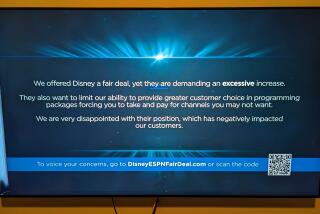Cable Firms Don’t Have to Carry Both Analog, Digital TV Signals
- Share via
WASHINGTON — Cable companies do not have to carry on their systems both digital and analog channels offered by broadcasters as they transition to new technology, regulators said Monday.
The Federal Communications Commission, seeking to speed the move from analog to digital television, concluded that such a requirement would place a greater burden on cable operators than needed to further “a substantial governmental interest.”
Digital TV allows broadcasters to offer crystal-clear pictures, more channels and new data services. Broadcasters are supposed to complete the switch to digital by 2006 or when digital TV reaches 85% of the market, whichever comes later.
In the interim, stations will have two channels--one digital, the other analog--so people still can watch broadcasts on existing analog TV sets.
Currently, cable operators are legally obligated to carry analog broadcast TV channels in their cable lineups, ensuring that cable customers can still see over-the-air programming--like NBC or Fox--that they would normally receive for free.
Broadcasters had argued that during the move to digital, when they are sending out signals in analog and digital formats, cable companies should pass both of these through to consumers. They argued this would give them a wider audience and a greater incentive to create digital programming, since about two-thirds of Americans get their television signals via cable.
But the FCC heeded the concerns of cable operators who said carrying both channels on their systems would use up too much of their capacity and force them to knock some popular cable programming off their systems.
More to Read
The biggest entertainment stories
Get our big stories about Hollywood, film, television, music, arts, culture and more right in your inbox as soon as they publish.
You may occasionally receive promotional content from the Los Angeles Times.









